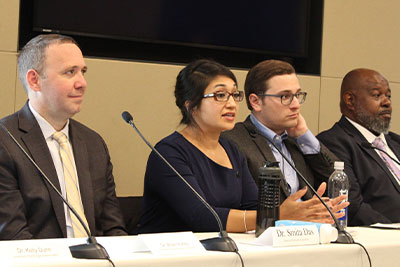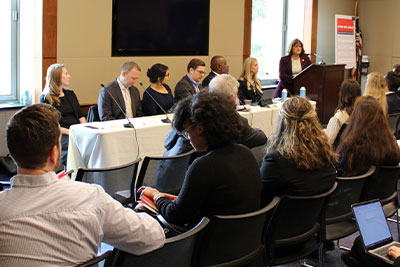Briefing Emphasizes Actions Needed to Address Substance Use Disorder Crisis
Abstract
Smita Das, M.D., Ph.D., M.P.H., was among a panel of experts who spoke to members of Congress and their staffs about the addiction crisis in this country and what actions Congress can take to address it.
A panel of experts on substance use disorders (SUDs) had a resounding message to send to Congress: Effective treatments for SUDs are available, but people across the country need Congress’s help in accessing them.

Smita Das, M.D., Ph.D., M.P.H. (center), speaks during the Congressional briefing about the importance of ensuring access to effective, evidence-based treatments for substance use disorders.
“As a psychiatrist who has dedicated my professional career to helping patients, I want to make clear that addiction is a chronic brain disorder, and it can be effectively treated,” said Smita Das, M.D., Ph.D., M.P.H., chair of APA’s Council on Addiction Psychiatry during the briefing, which was titled “A National Response to a Deadly Crisis: SUPPORT Full-Spectrum Addiction Care.”
Important steps have been taken to address the upward trend of opioid overdoses, as well as to reduce the stigma of addiction, Das said. For example, the 2018 SUPPORT for Patients and Communities Act addressed many aspects of the opioid epidemic, including prevention, treatment, and recovery. But more needs to be done, Das continued. Additional investments can help to build a robust workforce trained to provide addiction care, reduce barriers to access, and expand integrated care, she said.
Reps. Annie Kuster (D-N.H.) and David Trone (D-Md.) also attended the briefing. Kuster and Trone, along with Brian Fitzpatrick (R-Pa.) and Lisa McClain (R-Mich.), are co-chairs of the Bipartisan Mental Health and Substance Use Disorder Task Force.
One of the task force’s goals is to educate members of the House to recognize that both mental and substance use disorders are medical conditions that can be successfully treated, Kuster said. “I feel that we have been successful [in this effort],” she said.
Das was joined on the panel by Brian Hurley, M.D., M.B.A., president of the American Society of Addiction Medicine’s Board of Directors; Natalie Kirilichin, M.D., M.P.H., representing the American College of Emergency Physicians; Kelly Dunn, Ph.D., M.B.A., M.S., representing the American Psychological Association; and Philip Rutherford, chief operating officer of Faces & Voices of Recovery, which advocates for people in recovery from SUDs.
The briefing focused on four themes:
Prioritize prevention, health, wellness, and equity: The speakers emphasized the importance of investments in policies and programs that address underlying structural and social determinants of addiction.
Establish universal access to addiction medications as standard of care: The presenters emphasized that there are effective medications available to treat SUDs, but a significant number of people with SUDs cannot access them. Creative solutions are needed to help the many people with SUDs who do not have access to specialists for in-person care, Das said.
Ensure appropriate coverage of, and reimbursement for, effective addiction care: Public and private payers should comprehensively cover and provide reimbursement for the entire continuum of SUD care, the presenters said. Das also emphasized the importance of mental health parity, noting that the Mental Health Parity and Addiction Equity Act was enacted in 2008, yet true parity has not been achieved.
Strengthen the addiction care workforce: There are not enough professionals in the country with the knowledge and training to treat people with SUDs, the presenters noted. Psychiatrists are uniquely positioned to treat those with SUDs, as well as their co-occurring psychiatric disorders, Das said. “However, the shortage of psychiatrists and physicians trained in addiction medicine, addiction psychiatry, or pain management has created a long-standing, acute treatment gap for those with or at risk for SUDs,” she said.

Panelists at a Congressional briefing on actions Congress can take to address the substance use disorder crisis listen to Rep. Annie Kuster (D-N.H.) speak.
Additional efforts are needed to close the SUD treatment gap, Das said. Solutions include increasing access to treatment, decreasing stigma, coordinating care, and working together to help patients and communities recover from the impact the crisis has had on the country. “We must treat substance use disorders as the chronic diseases that they are,” Das said.
Kuster and Trone also spoke about the need to revise the Medicaid Inmate Exclusion Policy, which prohibits Medicaid from covering most services for individuals who are incarcerated, including those who have been detained and are awaiting trial. “People serve 30 days, 90 days, or 30 years, and then we all act totally shocked when they come out and go right back to their addiction,” Kuster said. “We are incarcerating people for drug offenses and then not giving them access to treatment.”
Kuster has sponsored the Humane Correctional Health Care Act (S 1821, HR 3514) that would repeal the Medicaid Inmate Exclusion Policy. Trone has also sponsored the Due Process Continuity of Care Act (S 2697, HR 6636), which would allow pre-trial detainees to continue receiving Medicaid benefits while incarcerated at the option of the state.
“People with mental health and substance use disorders who are reentering the community from incarceration are very vulnerable,” Das said. “Continuing coverage for those who are incarcerated, but also as they reenter the community, is the right thing to do.” ■



